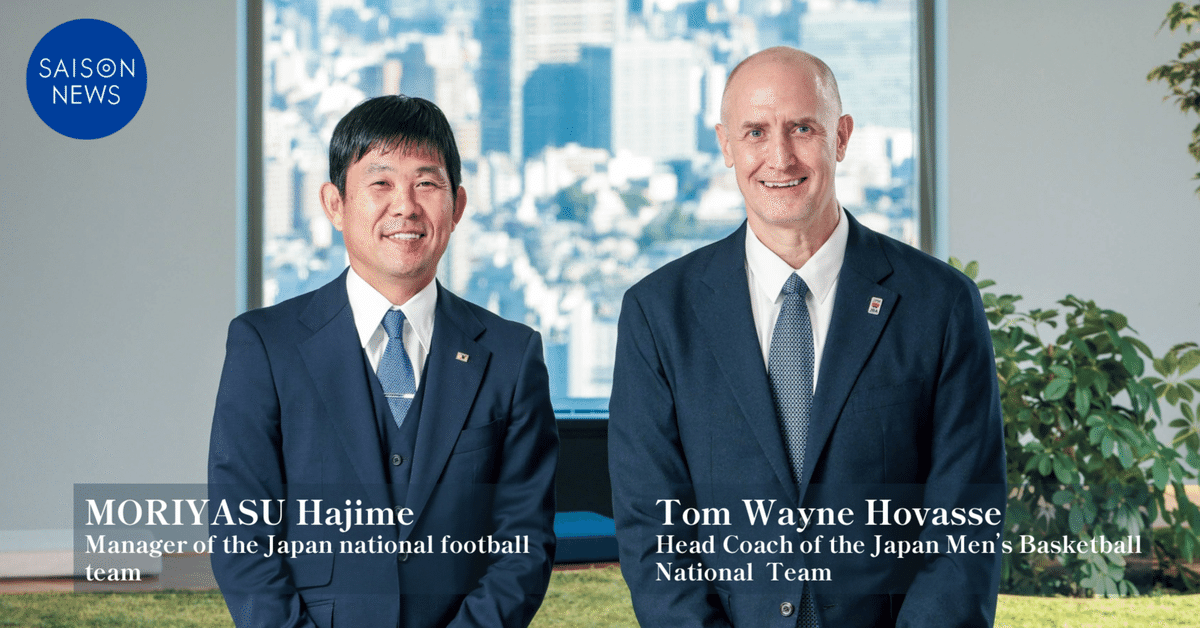
〈Special Interview〉The Heads of Japan’s National Teams Speak:Insights into Team Building
This interview is a conversation between two great national coaches in the world of Japanese sports, who overturned pre-tournament expectations and went on to lead their respective teams to victory. Hajime Moriyasu, manager of the Japan national football team, and Tom Wayne Hovasse, head coach of the Japan Men’s Basketball National Team speak about Japan’s world-class skills, and what it will take for Japan’s national teams to reach the top.
Text:Junko Hayashida,Natsuko Sugawara
Photograph:Keisuke Nakamura
※日本語での対談インタビュー記事は こちらからご確認ください。
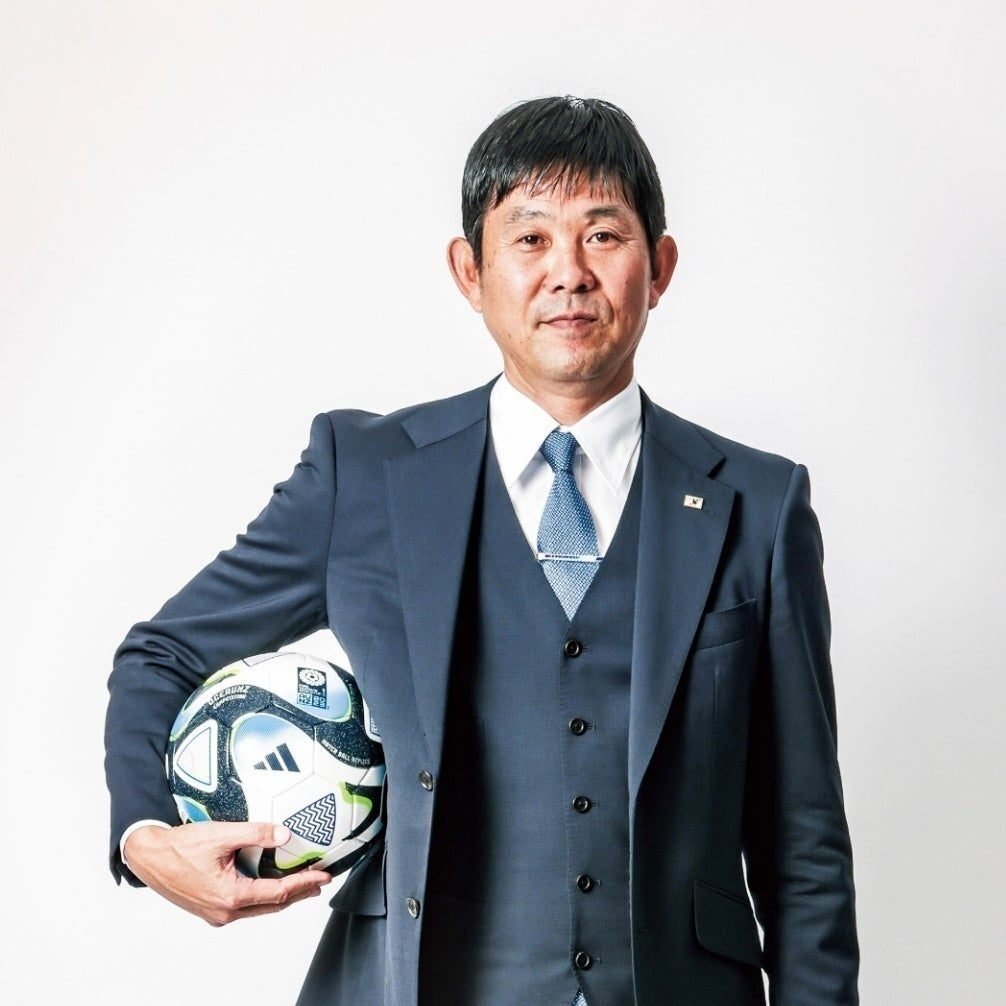
Coach
MORIYASU Hajime
Born in Shizuoka Prefecture in 1968. In 2017, Moriyasu became the manager of the under-20 national team preparing for the Tokyo Olympics, and in 2018 he was appointed as the manager of the main national team. At the 2022 World Cup in Qatar, Moriyasu led the national team to their first ever victory against Germany and Spain, and the team finished in the final 16. In 2023, he was named AFC Coach of the Year.
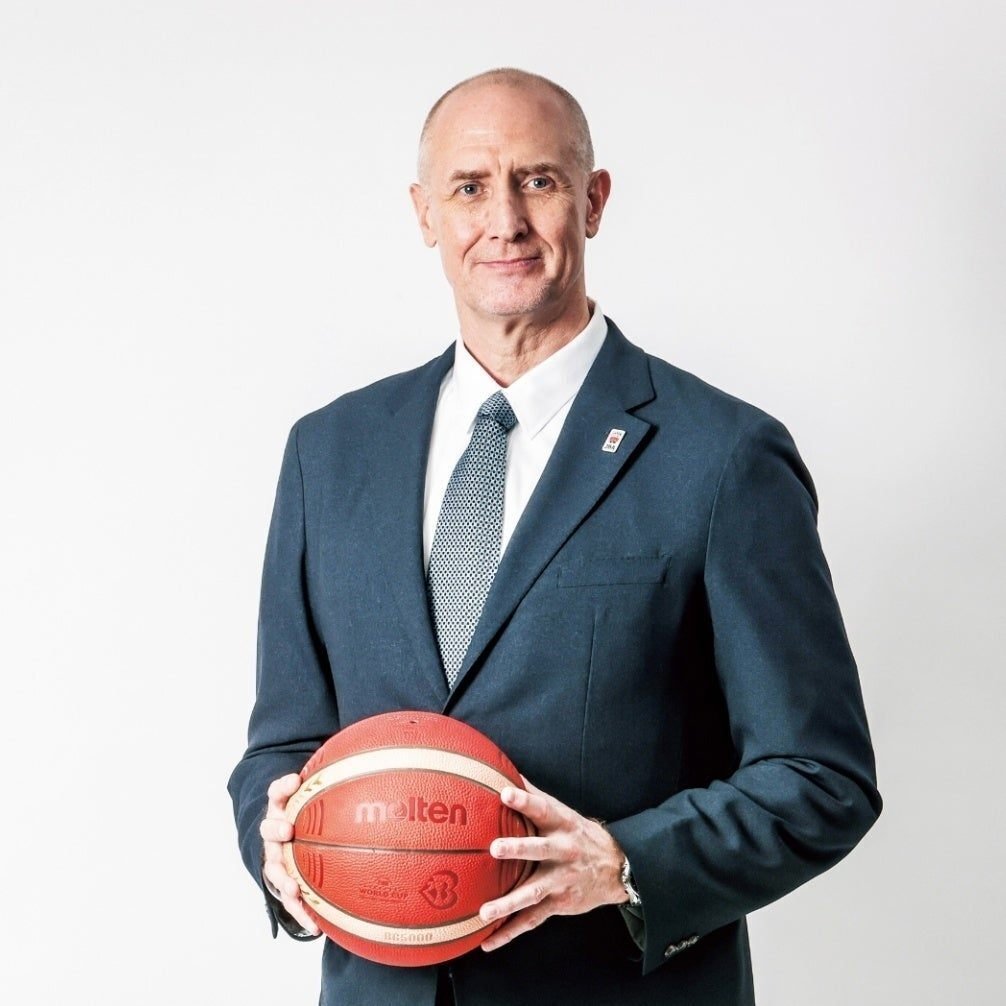
Head coach of the Japan Men’s Basketball National Team
Tom Wayne Hovasse
Born in the U.S. in 1967. In 2017, Hovasse became the head coach of the Japan Men’s Basketball National Team, leading them to win the first silver medal in the team’s history at the Tokyo Olympics in 2021. He has been the head coach of the Japan men’s national basketball team since 2021. At the 2023 Basketball World Cup, the men’s team qualified for the Olympics through their own efforts for the first time in 48 years, and will therefore be competing at the Paris Games in 2024.
◆Leveraging Identity as an Asset to Reach the Top
How to Create a Team that can Take on the World
Believing in one’s own skill
leads to strength
Moriyasu
Congratulations on your win at the World Cup. I was watching at home, and it was a very exciting match.
Hovasse
Thank you. You also did really well in football, winning against Germany and Spain. Then after that, Japan’s baseball team had a really strong performance, so I really felt the pressure to step up and deliver a win (laughs).
Moriyasu
Tom, you’ve lived in Japan for a long time, and although you are not Japanese, I think it’s great that in some respects you have fostered a Japanese mentality. There are some really advanced strategies and tactics being used around the world, but simply adopting them in Japan will not lead to results. In that respect, I’m impressed at the way you have built a team that harnesses the strengths of the Japanese players.
Hovasse
I’ve played in the NBA, and U.S. teams have both strengths and weaknesses. That goes for Japan as well. What I endeavor to do is build a team that mixes the strong points from the U.S. with the strong points from Japan. For example, one weakness in the U.S., though this doesn’t apply to everyone, is that players can be overconfident. On the other hand, Japanese players don’t believe enough in their own skill. However, they are arguably more patient and have better concentration than players from other countries. I’m constantly questioning my players as to why they don’t believe that.
Moriyasu
Now that you mention it, I’ve seen you shouting “Concentrate!” on TV (laughs). However, I also think that belief is important, especially in team sports. It’s absolutely essential that you believe in your teammates, the staff, and, moreover, yourself. I also want the fans to believe in the players.
Hovasse
In media interviews, I often get asked what I value most as a coach, but there are so many things that I can’t single one thing out as the most important. However, I do think that belief is essential. The reason is because I was the same. In basketball, the NBA is the top league in the world, and there were many players who were bigger, stronger, and faster than me. Nonetheless, I believed in myself. I thought to myself, “I’m not strong or fast, but I can do this.” Shorter players often complain that they’re not able to do anything because of their height, but from my perspective, height doesn’t matter. Even if you’re at a disadvantage in terms of height or speed, if you have a strong will and believe in yourself, you can accomplish anything. Determination is really important. It’s the same in football, right? If you believe in yourself, persevere, and gradually apply pressure to the other team, they will eventually lose confidence, and when that happens, your opportunity will come. That’s the style of coaching that I adopt.
Moriyasu
Yes, I often emphasize words like “tenacity” and “persistence” in meetings. I believe that’s one of the merits that Japanese players have. In our World Cup match against Spain, we were victorious, but the possession (time spent with the ball) was only 17.7%. After the World Cup, I was speaking to a Spanish person who is also involved in training coaches for the Japanese team, and I said that, ideally, I’d like it if we played more like the Spanish side, at which they were surprised, saying, “But isn’t the good thing about the Japanese team that they remain persistent?” At that moment, I was glad that someone from another country agreed regarding what we consider to be our strength. However, if we merely talk about the merits of the Japanese team without knowing anything about the rest of the world, we will easily be outperformed. We must first discover what the top standards are around the world, hone individual ability to be able to compete in terms of speed and physicality, and add in the mentality that sets Japanese players apart, so that we can surpass other teams. I build my team in this way because I believe it will lead to results.
Communication leads to
growth and victory
Moriyasu
Before the World Cup, we were aiming to get through the round of 16 and advance to the quarterfinals, something that Japan has never been able to achieve. However, the Asian qualifying stage proved to be a stumbling block when we won one of our matches and lost two, and the probability of us qualifying based on past data dropped to 0%. During a meeting at that time, the players asked what we were aiming for. I had been saying for a long time that the aim was to get to the World Cup quarterfinals, and in order to achieve that we would need to do our best and win our upcoming matches first, and so I thought that the whole team was aware of this aim, but it seems it had not penetrated at the emotional level. This caused me to reflect on the need to progress while constantly confirming goals.
Hovasse
Yes, it’s important to constantly reiterate things.
Moriyasu
That’s why, when it was decided that I would continue as manager until 2026, I made sure to make it known that our goal is to reach the quarterfinals. Of course, in my mind, the real goal was to become champions (laughs). Subsequently, after the meeting, the players asked me if that goal was ambitious enough. As a result, we all discussed the goal together, and decided that we should aim to win the World Cup.
Hovasse
That’s great.
Moriyasu
On the other hand, the Japan Football Association had said that the aim is to win the World Cup by 2050, so I’m not sure if we can achieve it now, but I think it is important to aim for the top and work hard toward that goal, so I asked the association to remove that time frame. Though we still lack what it takes to outrival teams like Brazil, Argentina, and France, that’s not to say we can’t win, we certainly have a chance. That’s why it was so good to hear the players announce that ambition of their own volition.
Hovasse
I also set ambitious goals. Then, when training camp starts, I ask the team, “Do you believe that we can achieve this goal?”, to which they all reply, “yes.” When you say it out loud to yourself, it prepares you mentally. Therefore, if someone complains along the way, I can remind them that they’ve already committed. As I mentioned earlier, it’s important to repeatedly tell the players to believe that they can achieve the goal. This is because the national team must create their own style of playing in an incredibly short amount of time. To get into the right mindset in such a short period, it’s necessary to keep saying things over and over. Especially in the case of basketball, around 20 players are invited to the training camp, but only 12 will be selected for the national team. The training camp is essentially a tryout. Since only the best players have been gathered in the first place, the difficulty lies in players who do not know their own role or the role of their teammates. My job is simply to tell the player what their role is, and to just focus on that. I think that once players are clear about what their role is, they are able to focus on what they need to be doing without hesitation. Maybe that role is different from the role the player has on their own team. But now they are on the national team, and that is the role they need to fulfill.
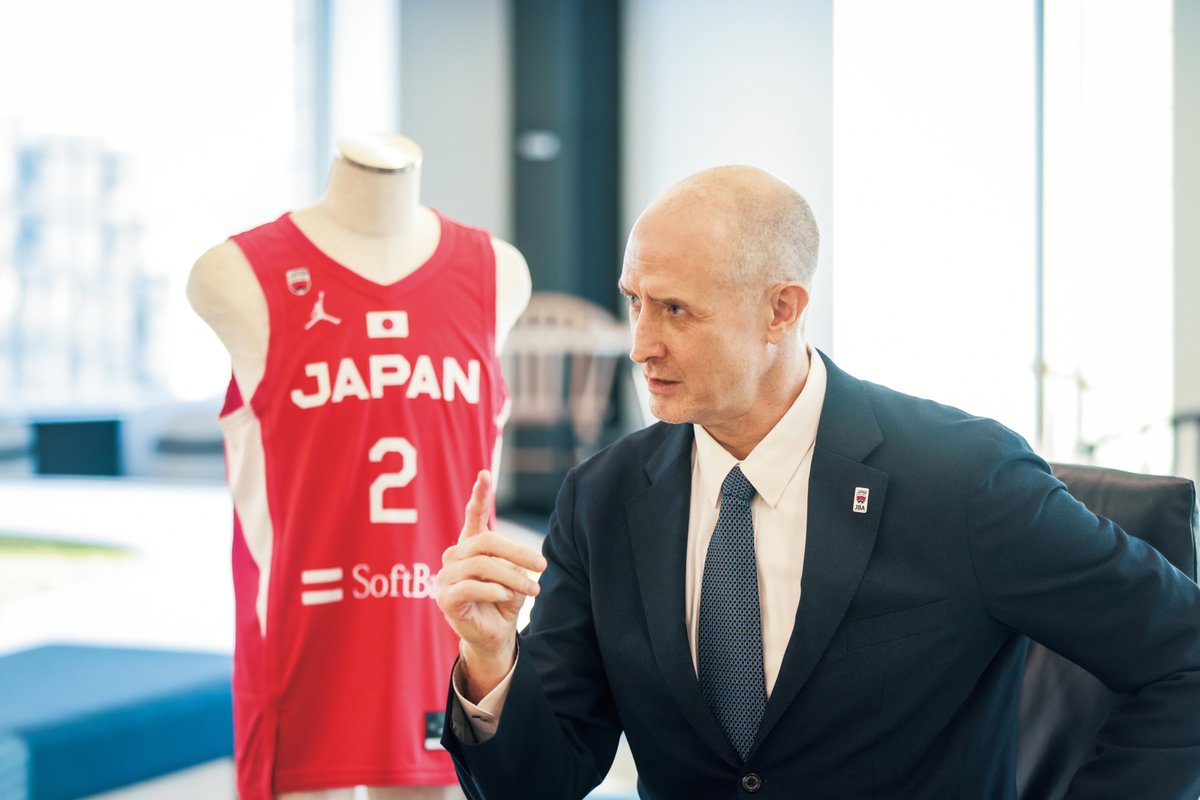
Moriyasu
That’s right. However, although it is a team sport, I also make sure to respect the individuals. If you emphasize tactics and roles over individual strengths, then I believe you have your priorities wrong. If you consider that a team starts with individuals, then you can further strengthen the team by bringing out players’ individual strengths, so I endeavor to make the most of individual strengths while also clearly communicating roles and tactics. And of course, there are various strengths that an individual can possess, such as physical strength, technical ability, mental strength, etc., but a definite requirement for players is to be able to connect with others. I don’t mean this in the sense of needless camaraderie, though: I tell the players to maintain a strong sense of self, but have the ability to connect with others and play for the sake of the other players, for the team, and for Japan.
Hovasse
When star players gather together, there are inevitably some players who are unable to leave behind their role and style of playing from their club.
Moriyasu
Exactly. Whether or not a player can follow the discipline required when playing on a team is very important. A variety of communication is also required to help players grow. This communication needs to be two-way: as coaching staff, we listen to players and provide feedback. I strive to communicate whenever and wherever it seems necessary, not just in the formal setting of a meeting, and turn it into something positive.
Hovasse
On the subject of communication, I am quite strict about greetings. I get angry when somebody doesn’t greet me, and I make sure to say good morning to everyone every morning. You can’t respect someone who doesn’t greet others, and if you can’t respect them, you can’t believe in them. It’s all interconnected. Americans don’t greet each other that much, but since coming to Japan I’ve come to regard it as very important.
Moriyasu
We also start with greetings in the morning. We don’t line up formally or anything, but we say good morning to each other when we make eye contact in the dining area. Some people think that greetings and communication are not important, but I want people to understand that greetings are extremely important, not only in sports, but also in our daily lives and interactions with other people.
Hovasse
Also, I have quite a passionate style (laughs), so players know my personality from our ordinary communication, and stick with me even when I get angry.
How to be angry
in a way that unleashes players’ abilities
Moriyasu
You mentioned anger just now, and I want to make it clear that I have only been angry once in the four years since becoming manager of the national team. It was reported on the news that I got angry during halftime in the World Cup match against Costa Rica, and you can see the clip on YouTube (laughs). Because of that people might think that I’m always angry, but it really was only that one time.
Hovasse
I get angry sometimes (laughs). However, I don’t blame or belittle the players. The reason that I got angry with the point guard Yuki Kawamura in the game against Australia was because I told him the defense strategy and to share it with the other players, which he did, and then Yuki himself forgot my instructions. When I pointed out that he was the one who I told the strategy to, he started making excuses, so I got angry and told him not to make excuses. I get angry at players when they’re not focused or putting in the effort. Obviously, players on the national team are all putting in the effort, so I tend only to get angry when they forget plays or are not concentrating.
Moriyasu
Yeah, I agree. I think that rather than saying I get angry, it’s probably more accurate to say that I’m pointing something out. That’s because I don’t seek to criticize the person’s character or vent my stress on others. Players need to be constantly aware of what’s happening, and whether what they were attempting to do was correct. Even if they are taking the correct action, they are going up against the opposing team, so they need to go above and beyond to win. When they are unable to do that, I advise them in strong tones. In the match against Costa Rica, if my players had really been giving 100%, then they weren’t a team that we couldn’t beat. Costa Rica simply outdid us in the scramble to gain possession of the ball. What is required more than skills and tactics is preparedness. Had they gone out onto the pitch with more determination, then we would have been able to win, but they were unable to establish a good pace during the game, which is why I had some strong words for the players. As Tom said, getting angry at players on the national team is not going to do anything to motivate them. They have already worked hard to overcome hardships and difficulties, that is why they are on the national team. I don’t think there’s any need to get angry since the players are far beyond that level.
Hovasse
Yes, the national team is full of amazing players. However, when a player underestimates their current abilities and thinks they are giving 100%, that’s when I step in and tell them that they can do more.
Moriyasu
Indeed. It is sometimes necessary to give players a bit of stimulation and advice to help them improve further.
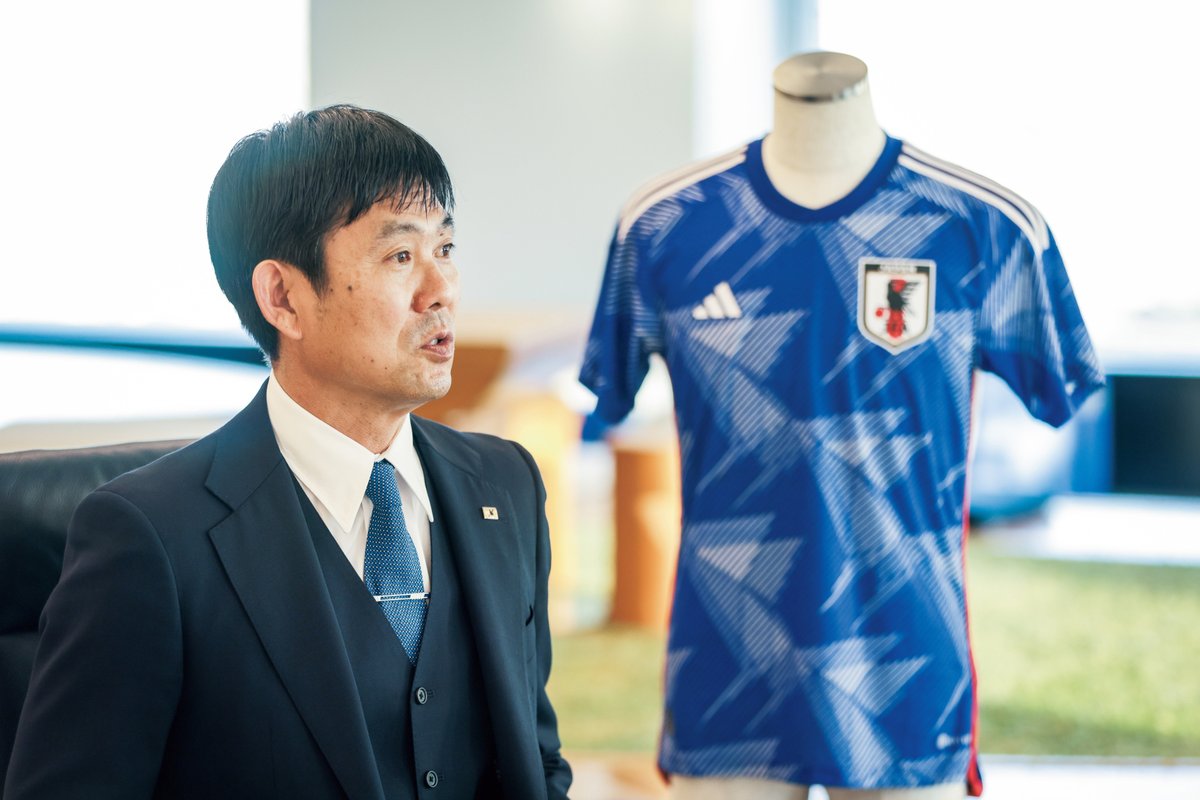
Reflecting on whether
you gave your best today
Hovasse
All players have their ups and downs. Sometimes they play well, sometimes they play poorly. But at the end of the day, if you did your best during a game when you played poorly, then that’s just something that can’t be helped. That’s why it is important to reflect on whether you did your best. I worked for an ordinary company in the past, and every evening I would look at myself in the mirror and ask myself whether I gave 100% and did my best that day. I think everybody should look at themselves in the mirror before going to bed and ask themselves whether they did their best that day.
Moriyasu
I totally agree. Prepare thoroughly, turn up ready for the match, and play to the best of your ability. If you are able to do that, then, regardless of whether you win or lose, I think you can at least feel that you have grown as a player. After matches, I always encourage players to challenge themselves so that they can feel that they’ve grown.
Hovasse
I can completely relate to that sentiment. If you want to improve and make a little progress today, then you will be able to play better basketball tomorrow. If you don’t have the desire to improve, then it ends there.
Moriyasu
In my playing career, I never had the chance to play for a team overseas, but I did play for the national team. Everybody considered themselves to be the top player, and improved themselves through friendly rivalry. It was thrilling to have that kind of incentive to spur you on. In football, there are 26 people on the bench, but not all players get to go out on the pitch. Nonetheless, I think it’s still worth assembling for matches, because it truly makes you want to improve while you’re there. Even when I was no longer selected for the national team, I was desperate to be able to experience that atmosphere again, even if I was just carrying players’ bags. It’s just such a stimulating and rewarding place that fills one with joy and pride.
Hovasse
Actually, after the World Cup, I spoke to some athletes at the Asian Games. I asked them what their goal was, and everyone answered that they wanted to compete at the Paris Olympics. If everyone has that level of enthusiasm, then Japan will surely become an even stronger contender at international competitions.
Moriyasu
Let’s do our best in our upcoming matches.
◆Staff Who Support Moriyasu and Hovasse
In team sports, it is essential to have people in supporting roles to assist the manager or head coach who leads the team, aid in creating the team’s direction, and share that vision. We spoke to two people who play such a vital role, and delved into the reasons behind the significant advances being made by Japan’s national teams in recent years.
Promoting the growth of younger players
and aiming for World Cup victory
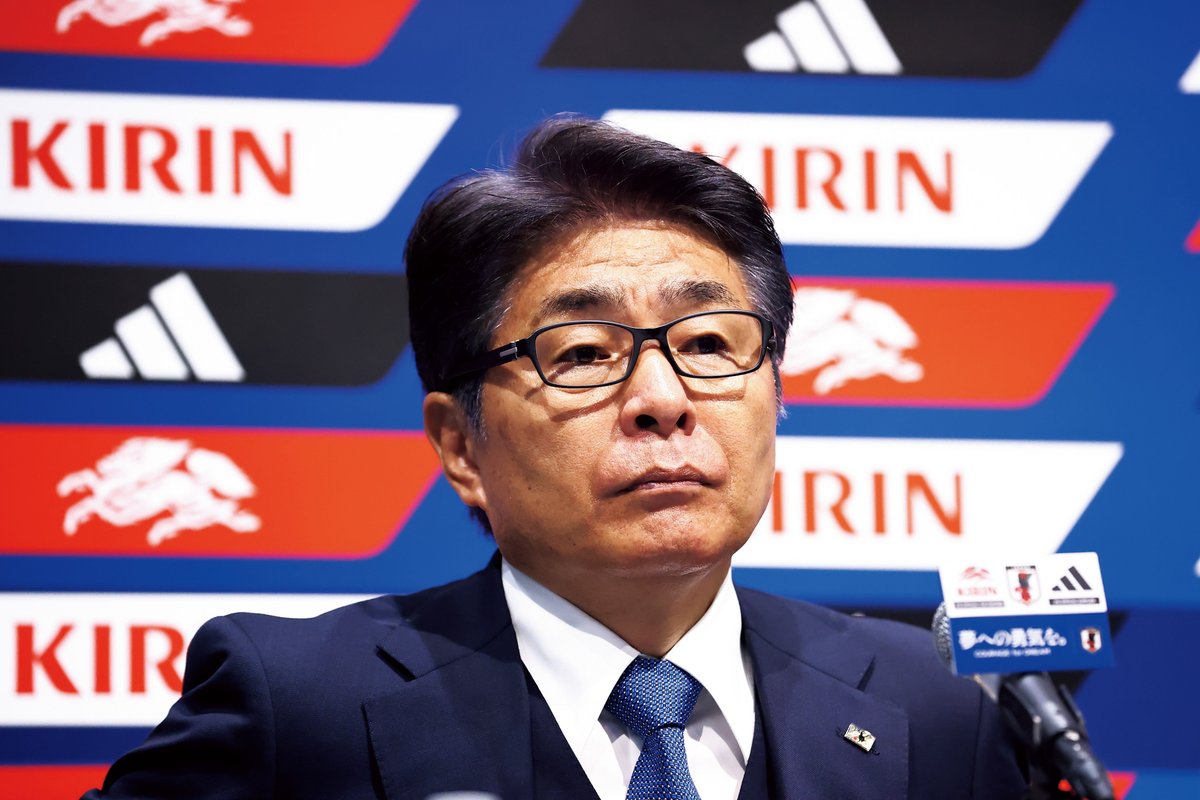
Director of the national football team
YAMAMOTO Masakuni
When he was a player, Yamamoto also played on the national team. In his coaching career, he has managed Júbilo Iwata , and the national team at the 2004 Athens Olympics, and also supported the national team as a coach for the 2002 FIFA World Cup. Yamamoto became the director of the national team in 2023. He is responsible for providing a wide range of support and strengthening of Japan’s national football teams, from the U-20 Japan National Team to Samurai Blue.
Masakuni Yamamoto, who played an active role on the national team during his playing career, has been involved in coaching for many years, including managing the U-20 and U-23 Japan National Team . He currently supports the national team in his role as the national team director.
“In coaching, I place importance on players’ growth. I competed in the World Cup for the first time in France in 1998, but before that, players like Hidetoshi Nakata had overcome tough qualifiers at the Atlanta Olympics, grown in confidence, joined the national team, secured victory at Johor Bahru, and led us to the World Cup. It was also their generation who competed at the under-20 World Cup for the first time. In other words, I don’t think that we would have been able to take part in the World Cup if it had not been for the growth of individual players.”
Samurai Blue have now competed in seven consecutive World Cup tournaments, and under manager Hajime Moriyasu they aim to come away as champions.
“We need to further develop players to achieve that goal. My role is less about teaching, and more about making people aware. It’s important to bring out players’ maximum potential. The World Cup is not something that you can win by simply doing what you have been taught. Football is a sport where you have to make your own judgments and move in an instant.”
Yamamoto also draws on his managerial experience in considering how to improve the team.
“When I was manager, I decided to choose a captain in a fair way that all players approved of. This is because no matter how many excellent players are on the team, they won’t be able to win if there is no solidarity within the team. Usually, individual players only spend a few minutes in possession of the ball during matches, and the rest of the time is spent supporting the team. The current Japanese national team is particularly good at orchestrating the movement of players who are not in possession of the ball.”
Surprisingly, no team has ever won the World Cup with a manager who is from a different country.
“As the Japanese national team continues to develop under Hajime Moriyasu as manager, I think we will surely reach the top.”
Unleashing the strengths of the Japanese national team
and leading them to compete on the global stage
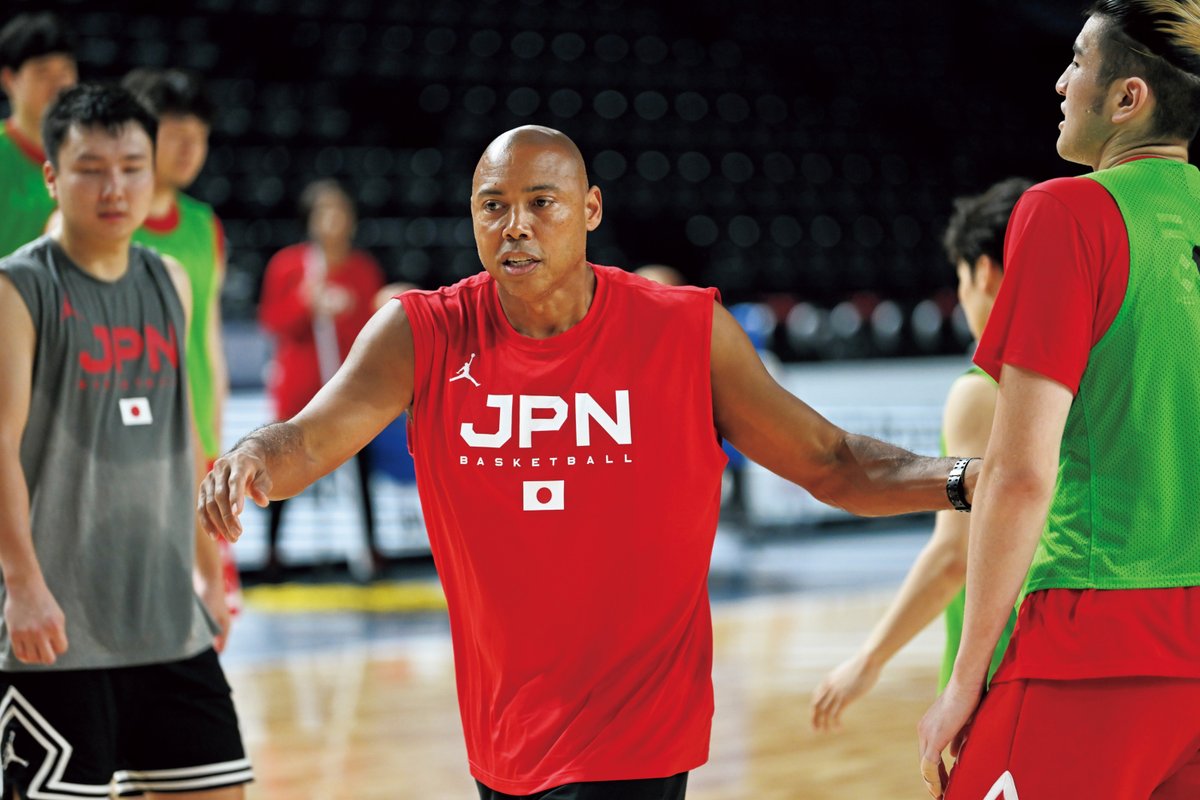
Associate Head Coach of the
Japan Men’s Basketball National Team
Corey Yasuto Gaines
As an NBA player, Gaines played for multiple teams, and also played for the Japan Energy Griffins in his grandmother’s home country of Japan. He began his coaching career with the WNBA, and served as an assistant coach in the NBA from 2013 onwards, coaching the Phoenix Suns, New York Knicks, and Washington Wizards. He has been in his current position since 2022.
Corey Yasuto Gaines is currently the associate head coach of the Japan Men’s Basketball National Team. He has played in the NBA, and became a coach after retiring from playing. After serving as an assistant coach in the NBA, he was appointed as an advisory coach for the Japan women’s national team in 2016, where Tom Wayne Hovasse was an assistant coach, and so he is someone with considerable experience who is intimate with Hovasse’s tactics.
“When I began coaching the Japanese national team, my first impression was that they were lacking in height and physicality. However, on spending time with the team at their training camp, I noticed their great aptitude for basketball. I think that is their biggest strength, and links to their playing style, which employs a “0.5 second mentality offence” This is the ability to make a judgment as to what to do a split second after receiving the ball. You can make up for the size disadvantage with this style of play.”
Coupled with this mentality, another thing that Gaines worked on with Hovasse was the players’ mindset when standing out on the court.
“Don’t worry about the past or the future, just focus on the present moment. Even if you fail, you cannot change the past. Instead, it’s important to move on to the next thing, and focus on the task at hand. With that kind of mindset, the players are able to do their best.”
In fact, at the World Cup match in Okinawa, the team was able to beat the physically larger and higher-ranking teams of Finland and Venezuela and earn themselves a place at the Paris Olympics. However, Gaines feels that such brilliant victories were down to what they gained in losing to Germany and Australia.
“Players learn more from defeat. Overcoming difficult matches with intense mental and physical pressure builds confidence. It is therefore important to experience games in such high-intensity situations. I think that gaining more of this type of experience is the best thing we can do to make the Japanese national team stronger.”
◆Editor’s afterword◆
Though their sports are different, Moriyasu and Hovasse have both led Japanese national teams to compete on the global stage. Even before we were ready to begin the interview, conversation naturally unfolded between the two without the need for interview questions, as they valued their time together and readily discussed tactics and strategies. “Belief” was brought up many times during the conversation. Japanese athletes tend to have slighter builds than their Western counterparts, and probably have a complex about this. However, 6’8” Tom Wayne Hovasse stated, “Height doesn’t matter, this is what’s important,” pounding his chest. Hajime Moriyasu also said it is important to believe in the Japanese team’s strengths of tenacity and persistence that they display in their playing style. There are many upcoming international competitions, not just in football and basketball, and the words of Moriyasu and Hovasse convinced me that we also need to believe and show our support. Speaking of Moriyasu, it’s a familiar sight to see him scribbling in a notebook at the side of the pitch, and today he had a notebook with him in his suit pocket. However, at the end of the interview, he admitted, “I was definitely planning on taking some notes for later, but I ended up enjoying myself too much and forgot to jot anything down (laughs),” revealing what a meaningful encounter it had been.
The Japan national football team will compete at the AFC Asian Cup Qatar 2023, which will take place from Friday, January 12th, 2024.
The Japan Men’s Basketball National Team will compete at the Paris Olympics, which will take place in July 2024.
Let’s believe in the strength of Japan and show our support!
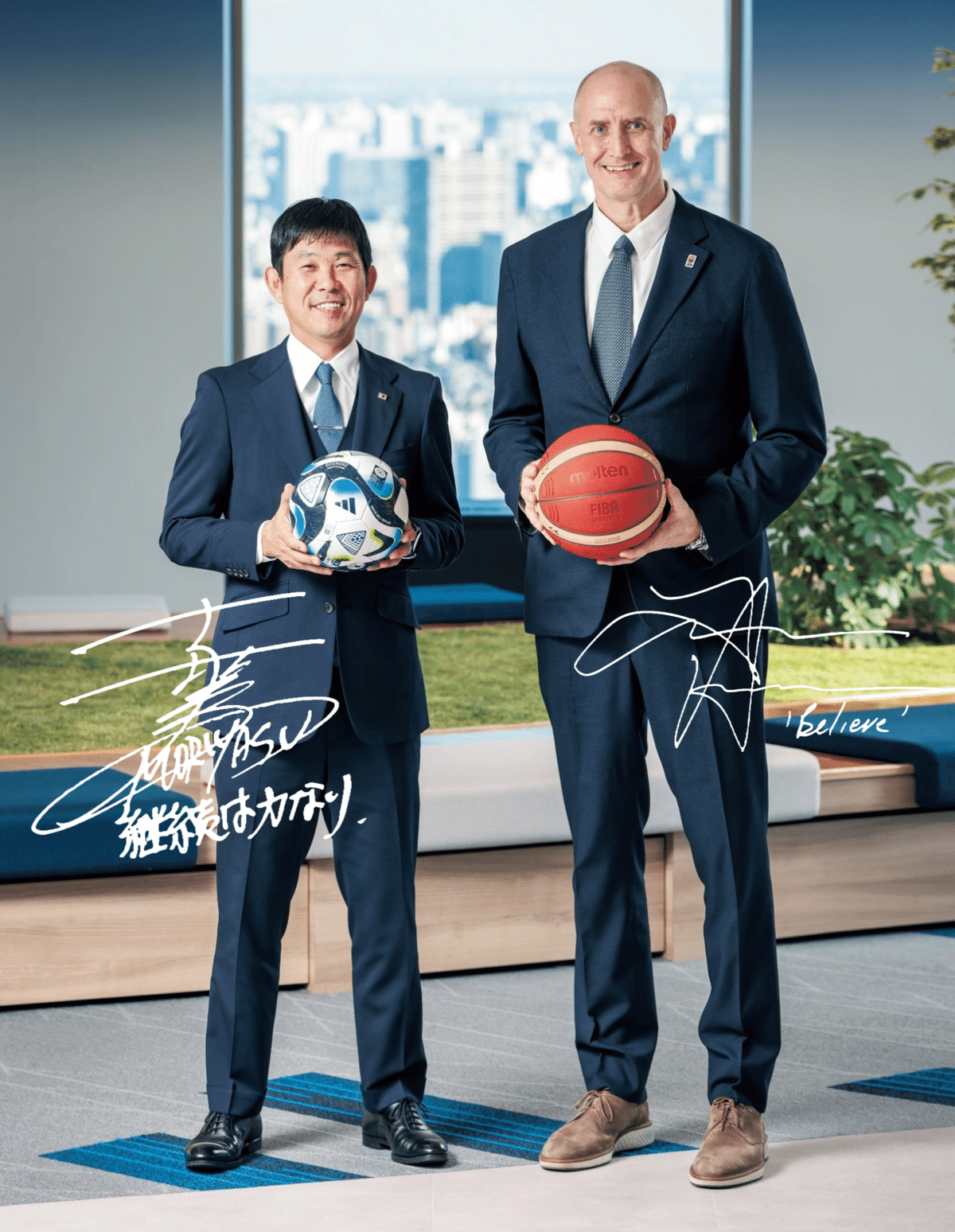
◆You can check the digest video of the interview
※This video is in Japanese.
※The interview information is current as of December 1, 2023.

